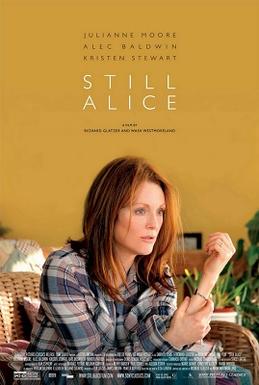 The Oscars don't embrace comedy and the nominated movies can be a bit of a slog to get through. Still Alice is based on the novel by Lisa Genova, which tells the story of a woman who develops early-onset Alzheimer's. That premise was enough to keep me from watching the movie for several months. However, I finally bit the bullet and watched it last week. It was terribly sad, but simply terrific.
The Oscars don't embrace comedy and the nominated movies can be a bit of a slog to get through. Still Alice is based on the novel by Lisa Genova, which tells the story of a woman who develops early-onset Alzheimer's. That premise was enough to keep me from watching the movie for several months. However, I finally bit the bullet and watched it last week. It was terribly sad, but simply terrific.Julianne Moore (almost guaranteed an Oscar) plays Dr. Alice Howland, a respected linguistics professor at Columbia University. She starts to feel like something is just wrong - always facile with language, she finds herself forgetting simple words and phrases, and when she goes on runs, she suddenly loses track of where she is and how to get back home. Concerned she has a brain tumor, she visits a neurologist, who tells her that she has early-onset Alzheimer's Disease. Her husband, John (Alec Baldwin), is supportive and loving, but gradually grows impatient and bewildered as Alice deteriorates rapidly in front of his eyes. Her three grown children (the excellent trio of Kate Bosworth, Kristen Stewart, and Hunter Parrish) have their own unique ways of dealing with the news, each with their own fears and reactions about what this means for them and their mother.
Less than her family though, this is emphatically a story about Alice herself, and how she is gradually losing everything that made her an intelligent, incredible woman. The writer-directors, Richard Glazer and Wash Westmoreland, do a brilliant job of incorporating both sweeping dramatic moments but more importantly, the minor heartbreaks that pinpoint the ways in which Alice is struggling to get by. At the beginning of the movie, she is playing Words with Friends with her daughter and is happily racking up triple word scores. As the movie progresses, she is hard-pressed to think of anything longer than three letters, until eventually her daughter just can't bear to play the game anymore.
Throughout the movie, composer Ilan Eshkeri's violin-laced score deviously tugs at your heartstrings and amplifies the everyday defeats that will build up over time. Moore's performance is miraculous - Alice starts out as an articulate, brilliant, confident woman, and then gradually this disease takes over her body and her brain. Her fight to make herself heard and stop her family from talking at her and making decisions about her as though she is no longer there is fierce and unforgettable. There are some genuinely frightening moments, others of quiet desperation. And finally, there's a message about the inevitability of how families deal with crises and who can be relied upon to be a caregiver for an ailing relative.
Still Alice is an impeccably crafted movie, well edited (1 hour and 40 minutes is the perfect length for a movie that deals with such a heavy subject), superbly acted, and lovingly told. The family dynamics are pitch perfect, the central and supporting performances are awe-inspiring, and it presents an urgent portrait of a devastating disease. It is heartbreaking and moving, difficult to watch, but entirely worth it.
No comments:
Post a Comment